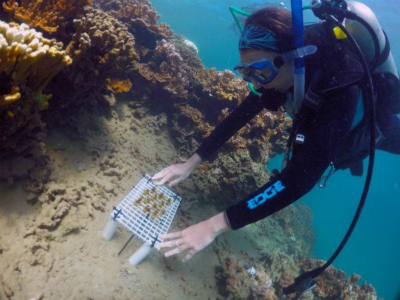(单词翻译:单击)
Can Lab Grown 'Super' Coral Rescue Our Rapidly Dwindling Reefs?
人造“超级珊瑚”能否挽救濒危珊瑚礁?
Rising water temperatures and the increasing levels of carbon dioxide in our oceans are killing our beautiful coral reefs at an unprecedented rate. Add the current El Niño weather pattern that is expected to prevail through winter and spring 2016 to the mix, and things look even worse. Scientists estimate that the 1988 El Niño destroyed almost 16% of the world's coral reefs and believe things could get even worse this time around.
不断上升的海水温度和二氧化碳浓度使美丽的珊瑚正以前所未有的速度消失。从去年冬天一直持续到2016年春天的厄尔尼诺天气也使情况变得更糟。据科学家估算,1988年的厄尔尼诺现象几乎毁坏了全球16%的珊瑚,这次甚至会毁坏更多。

The disappearance of the reefs does more than rob humans the chance to admire the beautiful structures. It removes a natural barrier that protects shorelines from storms and also leaves fewer habitat options for fish and other marine life.
珊瑚的消失远不止无法供人类赏玩这么简单。这不仅使海岸线少了一道天然保护屏障,也让鱼类和其他海洋生物失去了一样栖息场所。
To prevent these important animals from disappearing altogether, a team of researchers from the Hawaii Institute of Marine Biology are attempting to breed 'super' corals.
为了避免如此重要的物种灭绝,夏威夷海洋生物研究所的科学家们正努力尝试人工繁殖“超级珊瑚”。
The group led by Dr. Ruth Gates began by selecting certain coral species that seem to have adapted to the changing ocean conditions better than others. They then made them even more resilient by subjecting them to warmer, more acidic water at their research center on the 28-acre Coconut Island, in Kāne'ohe Bay off the Island of Oahu.
这个由Ruth Gates博士带领的团队先是从更耐受海洋环境变化的珊瑚中筛选出一些特殊种类。随后,他们在可可纳特岛上的实验室里,将这些珊瑚耐热耐酸性能培养得更强。该岛仅有28英亩大小,坐落于Oahu岛附近的Kāne'ohe海湾上。
The resulting strains are being bred with each other to create 'super' corals that will hopefully not just withstand, but thrive in the warmer, increasingly acidic oceans. Once ready, the researchers plan to transplant the coral into Hawaii's Kaneohe Bay, which has lost an estimated 60 percent to 80 percent of its coral to bleaching this year.
他们希望培养出的新品种通过杂交来产生既能在更暖且酸度更大的海洋里生存,又能不断蓬勃繁殖生长的“超级珊瑚”。“超级珊瑚”生成之后,科学家打算把它们移植到有60%-80%珊瑚发生白化的夏威夷Kaneohe湾中。
Although the researchers realize the dangers, Gates believes there is no choice but to intervene if we want to prevent the reefs from disappearing altogether. Tom Oliver, a marine biologist and team leader at NOAA's Coral Reef Ecosystem Division agrees. The expert who believes the project is both scalable and promising says, "The question is not can they do it, it's can they do it fast enough?" - We sure hope so!
虽然科学家意识到这样做有风险,Gates博士认为防止珊瑚完全灭绝,除了人工干预之外别无他选。同为海洋生物学家和美国国家海洋及大气管理局珊瑚生态系统分部领导的Tom Oliver也同意这一观点。 他认为该项目既可行也颇具前景,他表示:“问题并不在他们这么做是否正确,而是是否还来得及?”而我们当然希望为时不晚咯。
译文属可可英语原创,仅供学习和交流使用,未经许可,请勿转载


